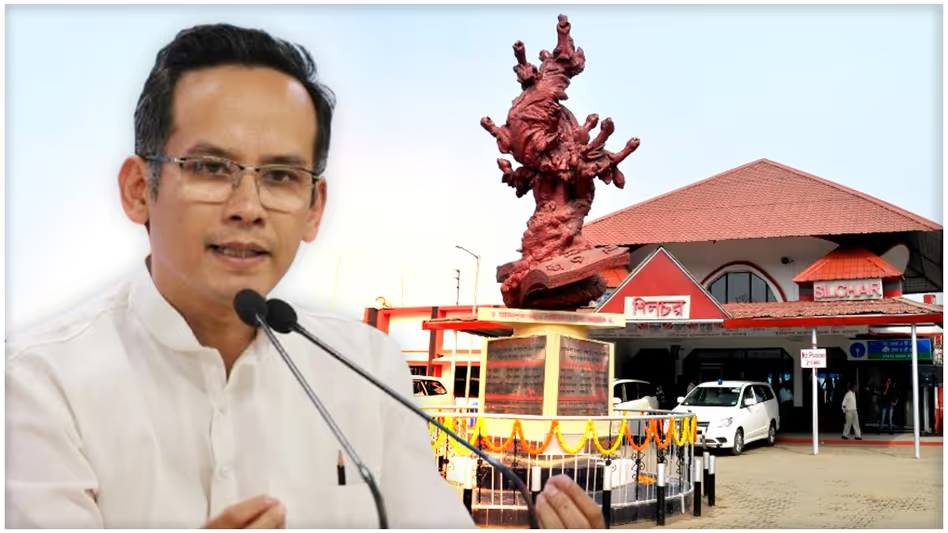In a recent political development, a Congress Member of Parliament (MP) has called on the Assam government to rename Silchar Railway Station in memory of the 1961 Language Martyrs. The demand aims to honor those who sacrificed their lives for the recognition of Bengali as an official language in Assam’s Barak Valley. This proposal, if implemented, would serve as a tribute to the martyrs of the language movement, who hold a special place in the history and identity of the region. The demand has sparked widespread discussions in Assam, with political leaders, historians, and citizens reflecting on the historical and cultural importance of the 1961 Language Movement.
The 1961 Language Movement and the Martyrs of Silchar
The roots of the demand lie in the 1961 Language Movement, which was a pivotal moment in the history of Assam’s Barak Valley. The movement was triggered when the Assam government, under the Official Language Act of 1960, declared Assamese as the state’s official language, leading to widespread protests in the Bengali-speaking Barak Valley. The people of the region, predominantly Bengali speakers, feared that this decision would marginalize their language and identity.
On May 19, 1961, a peaceful protest was held in Silchar, demanding the recognition of Bengali as an official language in the valley. However, the protest took a tragic turn when police opened fire on the demonstrators, resulting in the deaths of 11 people. These individuals, now known as the Language Martyrs, became symbols of the fight for linguistic and cultural rights in the Barak Valley.
Their sacrifice ultimately led to the Assam government amending the Official Language Act, recognizing Bengali as the official language of the Barak Valley. May 19 is observed as ‘Bhasha Shahid Diwas’ (Language Martyrs’ Day) every year in the region to commemorate their contribution.
The Demand to Rename Silchar Railway Station
The Congress MP’s demand to rename Silchar Railway Station is seen as an effort to institutionalize the memory of the Language Martyrs. The renaming of a prominent public place like the railway station would serve as a permanent tribute to their sacrifice and as a reminder of the cultural and linguistic diversity that defines Assam.
According to the Congress MP, the renaming of the station would also send a strong message about the importance of protecting linguistic rights and celebrating the multicultural heritage of Assam. He emphasized that such a move would unite the people of Barak Valley and the rest of Assam, fostering a spirit of harmony and mutual respect.
The MP further argued that honoring the martyrs through the renaming of Silchar Railway Station would strengthen the historical connection between the people of Barak Valley and their identity, which has long been shaped by the events of the 1961 Language Movement.
The demand to rename Silchar Railway Station has received mixed reactions from political parties, social organizations, and the public. While many in the Barak Valley have welcomed the idea, seeing it as a long-overdue recognition of the martyrs’ sacrifices, there are differing opinions on how best to honor their memory.
Many leaders and citizens in the Barak Valley have expressed support for the Congress MP’s proposal. They believe that the renaming of the railway station would be a fitting tribute to the 11 martyrs and would reinforce the significance of the Language Movement in Assam’s history.
Several social organizations and cultural groups have also backed the demand, calling it a step toward acknowledging the struggles of the Bengali-speaking community in Assam. These groups argue that the martyrs’ contribution to linguistic rights should be formally recognized at a national level.
Opposition from Some Political Quarters
However, not all political factions have been in favor of the move. Some leaders from the Brahmaputra Valley have expressed concerns that renaming the station might stir up old linguistic divisions in Assam, a state with a complex history of ethnic and linguistic diversity. Critics argue that while the martyrs should undoubtedly be honored, renaming public infrastructure might reopen wounds from the past, especially in a state that has made significant progress in fostering unity among its diverse communities.
The Assam government, led by the Bharatiya Janata Party (BJP), has not yet made an official statement on the matter. However, political analysts suggest that the ruling party may tread carefully, given the potential sensitivities involved in such a decision.
Renaming Silchar Railway Station would carry profound historical and cultural importance for the people of Barak Valley. It would serve as a lasting reminder of the 1961 Language Movement and the 11 martyrs who gave their lives for the protection of linguistic rights. The railway station, as a major hub of transportation and commerce, would symbolize the resilience of the region’s Bengali-speaking population in maintaining their cultural identity.
For the younger generation, such a move could serve as an educational tool, allowing them to learn about the struggles and sacrifices of their ancestors. It would also reinforce the importance of protecting linguistic diversity in a multicultural nation like India, where multiple languages and cultures coexist.
The demand to rename Silchar Railway Station in honor of the 1961 Language Martyrs has sparked important discussions about linguistic rights, historical memory, and cultural identity in Assam. While the proposal has been met with both support and criticism, it highlights the ongoing importance of the Language Movement in the region’s socio-political landscape.

